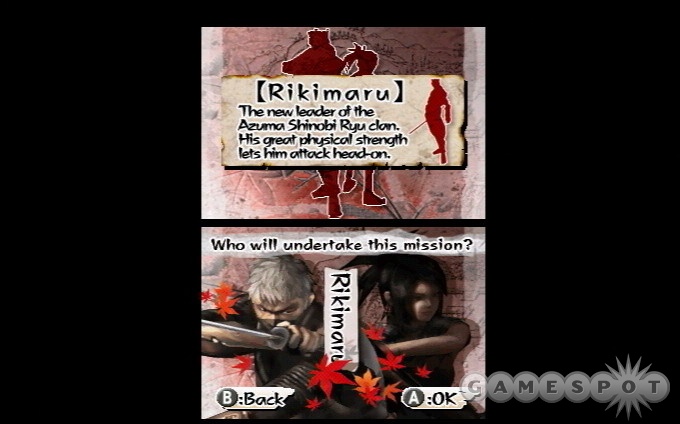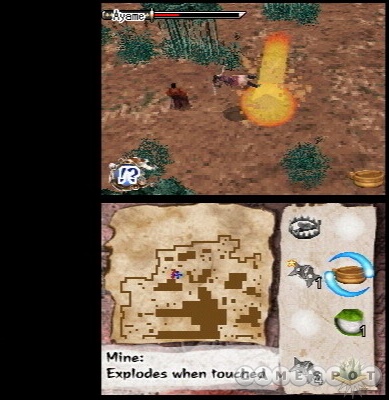Apparently even ninjas can fall flat on their face. Tenchu: Dark Secret, the new portable entry in the long-running stealth action series, bears a slight superficial resemblance to some of its great predecessors. But the gameplay itself is a mess--a confusing series of aimless, repetitive, and sometimes-frustrating missions that play like a mediocre Nintendo game from the 1980s. The action can still be oddly addictive for short bursts, and the game does have a few decent ideas that are new to the Tenchu series. But if the Tenchu name still means something important to you (or even if it doesn't), you'd probably be better off avoiding this one.

Tenchu DS seems promising enough on first impression. It's got two playable characters, Rikimaru and Ayame, whom fans of the series will instantly recognize. You'll choose one or the other at the beginning of any mission. The game's also got a surprisingly long-winded story, involving a princess who's being stalked by a growing number of enemies for mysterious reasons. Rikimaru and Ayame are recruited to defend her and so must take on a series of missions to disrupt enemy operations nearby. After every few missions, more of the storyline unfolds--through screen after screen of text--and occasionally you must fight a boss opponent of some sort. But most missions simply involve killing everybody or rescuing someone (usually by killing everybody anyway). There are momentary flashes of variety every now and then, but so many of the mission objectives, enemies, and even mission maps are recycled over and over again that the greatest challenge of the game soon becomes having the wherewithal to keep going.
That's partly because most missions are painfully simple. You view the action from a slightly skewed, overhead perspective and will spend your time running up behind enemies and slashing them, which kills most foes in one hit. Should an enemy actually spot you, he'll give chase as a few more cronies run in from offscreen, but it's very easy to run away...and sure enough, your foe will forget you were ever there in a matter of seconds. It's also very easy to sneak up on most foes, since the Nintendo DS's touch screen provides you with a real-time map that gives away enemy positions and the direction the enemies are looking. Enemies' patrols are rigid, robotic, and slow, so finding an opening takes little effort. Then, once you land a killing blow, the results are disappointing. The Tenchu series' elaborate stealth-kill animations are replaced here by static images of guys looking surprised. There's no gore and no style to any of the killing, and in fact, many of the bandits you face early on die not with a scream but with a noise that sounds an awful lot like a burp.
Remember how cool it was using the grappling hook to get to high ground or out of a dangerous head-on fight in earlier Tenchu games? Forget about it. Rikimaru and Ayame can jump and grab onto ledges and pull themselves up, but that's about the extent of their mobility. The two play almost exactly alike, but Rikimaru is stronger so he's better anytime you think you're going to wind up fighting head-on. You do get to use a fairly wide variety of other tools besides your sword, and the game's best feature is probably its crafting system. You can find ingredients from slain opponents or just lying out in the wilderness, and these can be combined to form various traps and other equipment--once you learn a recipe from a rescued villager. The game's depth, if it has any, comes from the ability to link traps together for combo kills. For instance, you can hit a guy in the back and knock him into an explosive trap or a bamboo spike trap. Yet the relative effort and patience required to pull off a trap combo hardly justifies the reward in bonus points and money you'll earn from this. That's not to say this game is always easy, since certain mission types will demand trial-and-error on your part until you figure out where all the bad guys are coming from, or get lucky fighting a tough boss.

The game's action feels flat and hollow. The 3D graphics are ugly and bland, and the sound effects and music are all over the place, ranging in tone wildly. In addition to its single-player mode, there's a four-player versus mode with several variants, but it requires each player to have a copy of the game, and the head-to-head combat in Tenchu DS is poor anyway. Also, there's a trading market available over a Wi-Fi connection. It's interesting in theory, being able to buy and sell items with friends and strangers over the airwaves, but it's a slow and clunky process that seems entirely unnecessary.
A straight translation of the traditional Tenchu gameplay might not have been practical on the Nintendo DS, nor would it have made for an original experience. But it's hard not to think about how much better something like that could have been as an alternative to this slapdash game. The only aspect of the Tenchu series that this game incorporates successfully is the part about having to run up behind enemies looking the other way. But there's a lot more to those games than that.